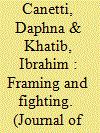|
|
|
Sort Order |
|
|
|
Items / Page
|
|
|
|
|
|
|
| Srl | Item |
| 1 |
ID:
179900


|
|
|
|
|
| Summary/Abstract |
How do leaders of indigenous minorities perceive political events among their trans-state national group? What motivates their attitudes toward these events? This article, drawing on a survey and elite interviews, examines the attitudes of Palestinian leaders in Israel, as a case study of an indigenous minority, toward the events (the Arab Spring) in their trans-state national group. The findings suggest that attitudes of Palestinian leaders in Israel toward the Arab Spring are determined by three main factors: their national or religious collective identity rather than their civic identity (national level), their values (international level), and the backdrop of the Arab-Israeli conflict (local level). The implications are as follows: an absence of change in Palestinians’ traditional alienation toward Israel; membership in the Arab world has somewhat replaced the framework of the Israeli-Palestinian conflict as a basis for positions toward regional issues; Palestinian leaders in Israel are divided regarding their values, fears and hopes for change; and that the interaction between the Israeli and international sphere determines their attitudes as an indigenous people. The intermixing of these elements shows the flexible (sometimes secondary) role of collective identity and the rise in democratic values rather than traditional issues.
|
|
|
|
|
|
|
|
|
|
|
|
|
|
|
|
| 2 |
ID:
168996


|
|
|
|
|
| Summary/Abstract |
How does the subjective conceptual framing of conflict impact the warring parties’ attitudes towards political compromise and negotiation? To assess strategies for conflict resolution, researchers frequently try to determine the defining dispute of a given conflict. However, involved parties often view the conflict through fundamentally distinct lenses. Currently, researchers do not possess a clear theoretical or methodological way to conceptualize the complexity of such competing frames and their effects on conflict resolution. This article addresses this gap. Using the Israeli–Palestinian conflict as a case study, we run a series of focus groups and three surveys among Jewish citizens of Israel, Palestinian citizens of Israel (PCIs), and Palestinians in the West Bank. Results reveal that three conflict frames are prominent – material, nationalist, and religious. However, the parties to the conflict differ in their dominant interpretation of the conflict. Jewish Israelis mostly frame the conflict as nationalist, whereas Palestinians, in both the West Bank and Israel, frame it as religious. Moreover, these frames impact conflict attitudes: a religious frame was associated with significantly less willingness to compromise in potential diplomatic negotiations among both Jewish and Palestinian citizens of Israel. Interestingly, differing frames had no significant impact on the political attitudes of West Bank Palestinians, suggesting that the daily realities of conflict there may be creating more static, militant attitudes among that population. These results challenge the efficacy of material solutions to the conflict and demonstrate the micro-foundations underpinning civilians’ conflict attitudes and their implications for successful conflict resolution.
|
|
|
|
|
|
|
|
|
|
|
|
|
|
|
|
|
|
|
|
|